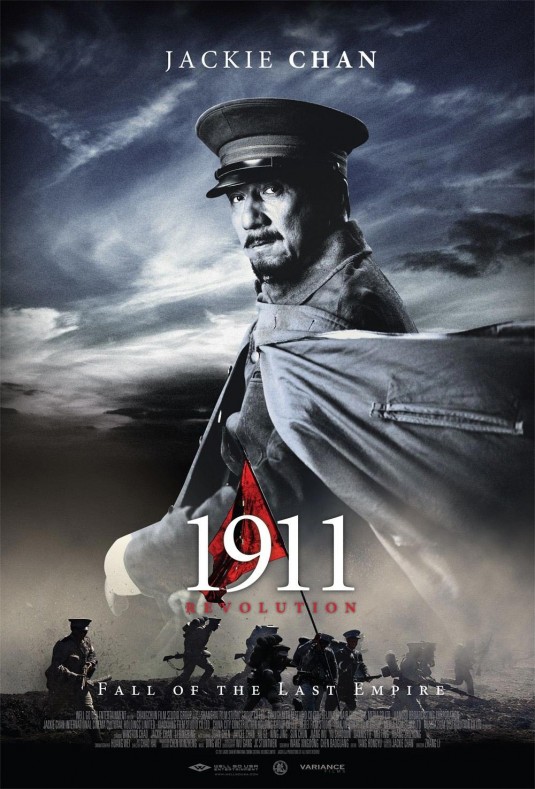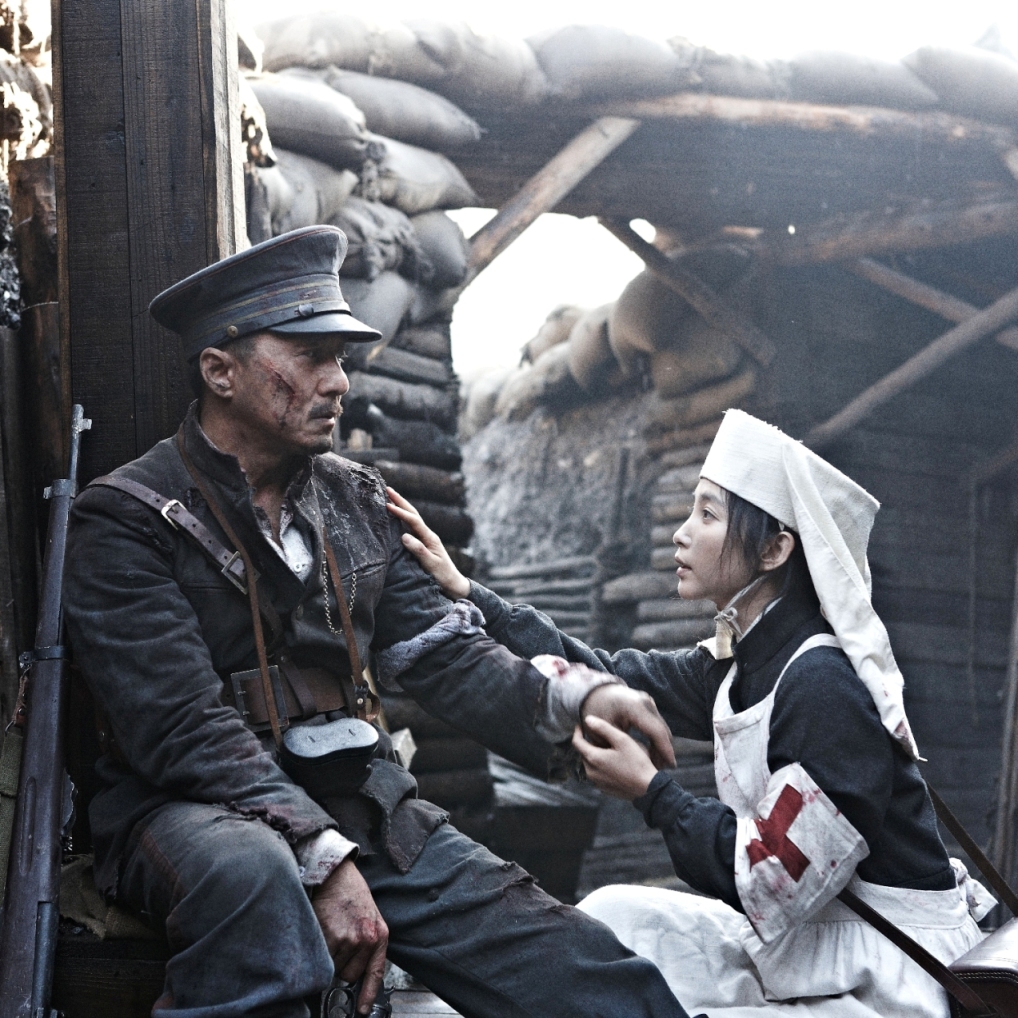by Patrick Huang
語言:
English
Photo Credit: Gage Skidmore
JACKIE CHAN IS a veteran actor, beginning his career in Hong Kong film production and later entering Hollywood film production. In recent years, he has been delineated in mainland China’s film production, e.g., the film 1911 (2011) and Dragon Blade (2015). I note, in mainland China’s film culture, the Chinese Communist Party (CCP) has ultimate control over the production theoretically under the supervision of the State Administration of Press, Publication, Radio, Film and Television of the People’s Republic of China (SAPPRFT). This fact is thought-provoking and I am wondering whether or not its portrayal of his character is subject to alteration, given these two film cultures.
I will focus upon the film 1911 (2011) for the case study in this article, since it is not only the first official film Jackie Chan plays in mainland film production, but it is the film that he himself strongly defended that it is not at all propaganda. The latter raises the question of whether or not Jackie Chan is playing the role of the CCP’s spokesman. Indeed, during the Umbrella Movement in Hong Kong, Chan said “Hong Kong has become a city of protest […] People scold China’s leaders or anything else they like and protest against anything”. This is illustrative of how he significantly involves himself in China politics.
Plot Summary
1911 IS LARGELY propaganda-oriented, recounting the history of founding of the Republic. Jackie Chan plays Huang Xing. At the beginning of the 20th century, Sun Yut-Sen attempts to topple Qing Dynasty. Several efforts fail. Until the end of 1910, Sun solicits overseas backing from the Chinese Revolutionary Alliance, among its members is Huang Xing.
The revolution will happen in the number of provinces. In Guangzhou the attempt fails. Instead, the Qing Dynasty becomes aware it is being assailed. Several attempts at revolution are made.
Sun is traveling to various countries influencing banks not to give loans to the Qing regime, whereas in the other side Xing is acting as the army general. Soon later, Xing is forced moving further down the Yangtze River, consolidating power. Battleships sailing along Yangtze, there is a good news proclaiming that a number of provinces have already declared independence. This is the end of Qing Dynasty and China establishes the first republic in Asia.
 Film poster for 1911. Photo credit: 1911
Film poster for 1911. Photo credit: 1911
The representation of Jackie Chan in 1911 more broadly reflects Confucian values. There are a Confucianism principles here and there in his characterization. We might consider the dichotomy present in the ideal of Confucian masculinity, where the dichotomy of Wen-Wu; wen represents the man of intellectual; wu, the man of warrior. This notion, too, appears in the film 1911 in which Jackie Chan is a crucial protagonist who brings Wen-Wu to mainland Chinese culture.
What is Wen Wu?
THE CONCEPT OF wen (文) and wu (武) is directly derived from Confucian thought, which we can still see as present in the cultural configuration of the valorized ideals of Chinese masculinity. The notion is most prevalent in China but is also reflected in other East Asian cultures. The wen-and-wu dichotomy incorporates the issues of mental and physical attainment in masculinity. Both elements are expected for Chinese manhood. A man either belongs to wen or wu, or even possesses both of them and thus qualifies as a model of ideal masculinity. According to the concept of the wen and wu, Mu points out the following:
The core meaning of Wen centers on literary and cultural attainments that would distinguish a civilized man from an untutored savage. The core meaning of Wu centers on martial, military, force, and power. As for whether Yin or Yang is to account for these traits, Confucius emphasizes, Wen and Wu necessarily occurred in the male sex. Men with Wu were restricted to the rules of being righteous, courageous, responsible, self-disciplined, and loyal to the emperor. [1]
This concept divides masculinity into two types. Firstly, men with the wen are those with good knowledge and mannerism, seen as civilized and less aggressive. Secondly, men with wu are those with physical power and patriotism and act more aggressive. Louie adds that “Wen expresses these qualities through arts and literature. The scholarly government minister who draws paintings and composes great poems is the epitome of Wen.” [2] Men with the wen always enjoy the position which requires knowledge of arts. However, there is a claim that men with the wu are inferior to those with the wen.
In Neo-Confucian interpretations, Wu is inferior to Wen as representing the need to resort to force to achieve one’s goals. Naturally, Wen officials came to enjoy higher positions than Wu officials did. With the official adaptation of Confucianism, Wu officials and force became relegated to a minor role, only to be called upon when problems could not be solved by Wen officials, or by means of courtesy and benevolence. [3] Thus, by way of neo-Confucian revisionism, men with wen who are considered as civilized men solving problems as intellectuals are perceived as superior to those with wu. Men with wen are always a good consultant for those with the wu. The Chinese proverb zhong-wen-qing-wu (重文輕武) confirms this notion. Its literal meaning is to put the intellectual man above the warrior. Based on this proverb, it can be concluded that ancient Chinese regards the wen is above the wu.
Interestingly, although it seems that wen has dominance over wu in terms of social position, wu can also be regarded as a type of hegemonic masculinity since the wen-wu dichotomy introduces two types where their roles of masculinity are not mutually related, but each has its own expert field; wen, intellectuality; wu, military.
Exploitation of Wen Wu in Huang Xing Character
WEN USHERS IN the general concept of a male intellectual. In traditional Chinese culture, Wen people are believed to enjoy a higher position than are Wu counterparts. In 1911, Xing performs the best epitome of wen, compared to Hong Kong and Hollywood productions where Chan is often represented as cunning and jocular. His appearance here as an army general looks serene. Some scenes, in addition, prove that he is a good problem-solver.
 Still of Chan in 1911. Photo credit: 1911
Still of Chan in 1911. Photo credit: 1911
Wu introduces the general concept of a man of warrior. It is interesting in that although Hong Kong and Hollywood productions have been also addressing this principle, they are never emphasizing more apparently than does mainland film culture. With the character “a general”, Chan is portrayed as heroically brave. Many scenes demonstrate his hardship during the war. For instance, Xing, despite his serious wounds, survives several attempted attacks and, furthermore, enhances his comrades’ morale.
All in all, compared to Hong Kong and Hollywood film productions, Chan possesses the evident character of both Wen and Wu in mainland China’s film culture. This cinematic representation turns to be a mechanism for the CCP to socialize audience-citizens. One can see that the CCP is exploiting Confucianism through the pragmatism of wen-wu- to (re)shape mainstream Chinese culture. It is to say, the CCP would like its people to follow Jackie Chan in Wen-Wu way as an ideal of masculinity. The philosophical values of Wen-Wu are assimilated into their daily routines through mass media, in order that these ideals are easier to understand.
[1] Zhou Mu , Masculinity in Chinese History,” The Asian Journal of Brandeis, Boston: Moonsoon Press, 2005, 9.
[2] Kam Louie. Theorizing Chinese Masculinity: Society and Gender in China. Cambridge: Cambridge University Press, 2002. 139.
[3] Zhou Mu , Masculinity in Chinese History,” The Asian Journal of Brandeis, Boston: Moonsoon Press, 2005, 9.


 Film poster for 1911. Photo credit: 1911
Film poster for 1911. Photo credit: 1911